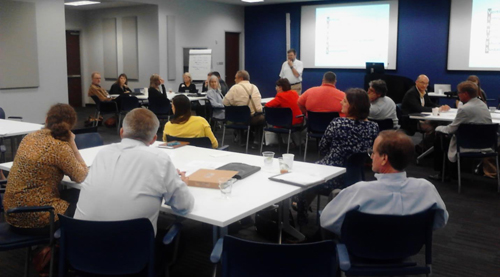
May 10, 2013 VIRTUES Manufacturers Workshop, Gulfstream Aerospace
Corporation, Savannah, GA.
The Ray C. Anderson Foundation awarded a grant to Georgia Tech for a project called VIRTUES (Vertical Integration of Research, and Technical, Undergraduate, and graduate Education for Sustainability). Headed by Michael Chang, Deputy Director of the Brook Byers Institute for Sustainable Systems, and Mary Hallisey-Hunt, Director of Special Projects for the Strategic Energy Institute, the leadership team also included faculty and administrators from Georgia Southern University and the the Board of Regents of the University System of Georgia, and industry partners from across the state. VIRTUES is a step toward developing a proactive process to incorporate the practice of sustainability throughout the workforce, not in the workplace as is occurring now at great cost to employers, but at earlier stages of educational experiences and workforce development when minds and practices are still forming.
The VIRTUES team used a combination of published literature on the subject of sustainability education, recent surveys of employers and educators including two administered directly by VIRTUES, and roundtable workshops hosted with Georgia industry representatives and post-secondary educators to discern initial findings and reflections from each constituency. VIRTUES consists of four elements:
- Characterize the workforce needs of employers, and in particular manufacturers, as they relate to sustainability.
- Assess what colleges, universities, and technical colleges in Georgia are doing to educate and train students to contribute to the sustainability of the organizations that they may work with upon graduation.
- To identify the “gaps” between #1 and #2 above.
- To identify possible solutions that can be enacted in Georgia’s higher education institutions to close the gaps identified in #3.
Key Findings: Sustainability and the workforce needs of employers in Georgia.
- Employers greatly value experiences and education activities that occur in “real world” settings.
- Employers find graduates to be lacking competency in a host of soft skills including the ability to manage multiple priorities, possessing creativity in solving complex problems, and demonstrating the ability to think critically, plan strategically, and act logically.
- Young employees do not seem to be cognizant of how their actions impact the financial bottom line in business environments where return on investment is of paramount importance.
- Workplace sustainability initiatives were largely started and led by management. Once initiated, however, all levels of the organization were engaged, often in well defined, but ad hoc teams to implement the directives.
Key Findings: Sustainability and higher education in Georgia.
- There is wide variation in sustainability education at Georgia’s colleges, universities, and technical colleges despite a widespread adoption of sustainability advances and practices on the facilities and operations side of many of Georgia’s higher education institutions.
- Sustainability related course offerings are most abundant at the individual undergraduate level where a large number of students are most engaged.
- There is no common core of knowledge or skills related to sustainability that all students are expected to obtain, and by extrapolation, can find common ground over later in their careers.
- Graduate education may be the most difficult segment of higher education for sustainability to gain traction.
- Extra-curricular and co-curricular activities present tremendous opportunities for introducing students to, and engaging them in sustainability.
- There is very limited assessment by which to determine if any of the sustainability related activity that is occurring in higher education is having any lasting effect.
- The clear return-on-investment that is pushing more funding for sustainability in campus capital projects and operations has not carried over to the education side.
For further information on VIRTUES, the executive summary, full report, and final presentation are available for .PDF download.
The Brook Byers Institute for Sustainable Systems enhances Georgia Tech’s research, education, and service missions, and campus operations through leadership, communications, development, and decision making inspired and defined by the principles of sustainability. Sustainability is a core value at Georgia Tech that touches every person, action, and decision within the Institute. Programs and projects initiated or supported by the BBISS lie at the intersections of these themes.
The Strategic Energy Institute was established to serve as a conduit for integrating, facilitating, and enabling Institute-wide programs in energy research and development. Engaging the best and brightest from industry, government, and academia, the SEI will create innovative solutions to current and future energy challenges.
The Ray C. Anderson Foundation was created in honor of the late Ray C. Anderson (1934-2011), founder of Interface, Inc. During his time at Interface, Ray championed the notion of businesses doing well by doing good. It’s these noble qualities of advancing knowledge and innovation around environmental stewardship and sustainability that recognized Ray as a pioneer in industrial ecology. The purpose of the Foundation is to perpetuate these shared values and continue the legacy that Ray left behind. Through research and funding, the Foundation aims to help create a better world for future generations— tomorrow’s child.



